Mineral Health Benefits – Learn About Why Minerals Matter
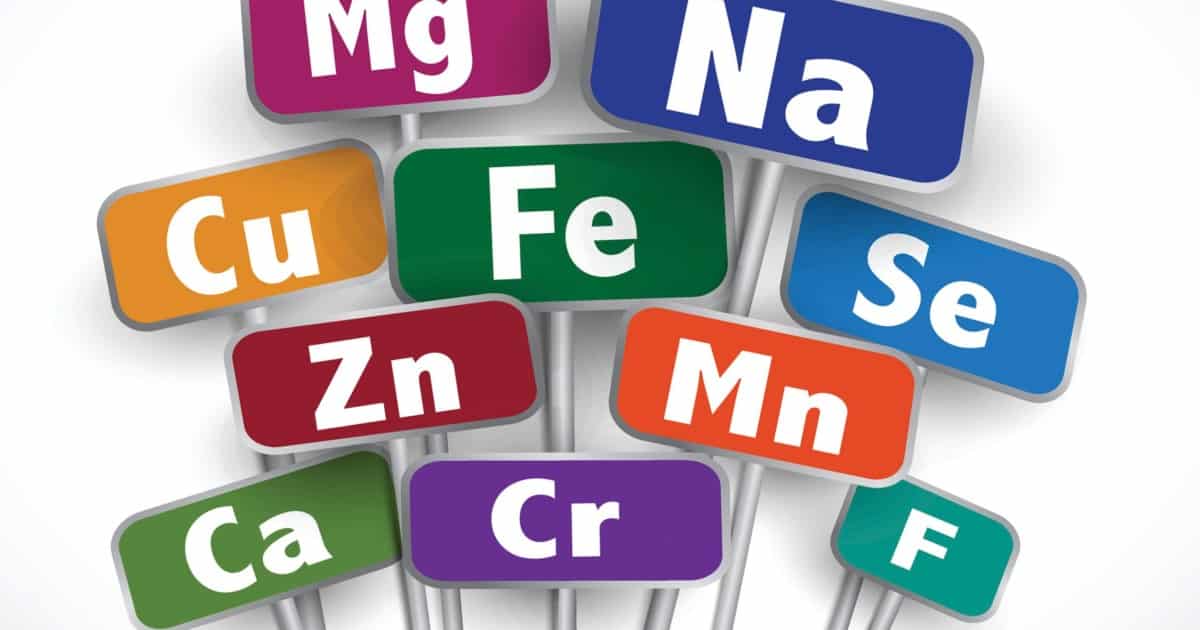
We know how essential vitamins are for our bodies, but what about minerals? Minerals perform various vital functions, including keeping our bones, muscles, heart, and brain working properly. Minerals are found naturally in soil and water. Because minerals are not found naturally in our bodies, the food and water we eat and drink fuels our bodies with needed minerals. According to the U.S. Department of Agriculture (USDA), sadly, most adult Americans aren’t getting enough of these nutrients, including calcium, potassium, and magnesium.
According to the Food and Drug Administration (FDA), minerals are inorganic substances not made by living things. Minerals are broken into two categories:
- Macrominerals: Our body requires large amounts to reap the benefits
- Trace Minerals: Our body needs just a smidge for optimal health
Cooper Clinic recommends a “food first” philosophy, meaning our body’s nutrients should come from our diet first. However, if you’re not getting the recommended amount through the food you eat, supplements can help. Calcium Citrate Supplement supplies 500 mg of elemental calcium from calcium citrate in each serving of two tablets. The citrate form of calcium provides superior absorption.
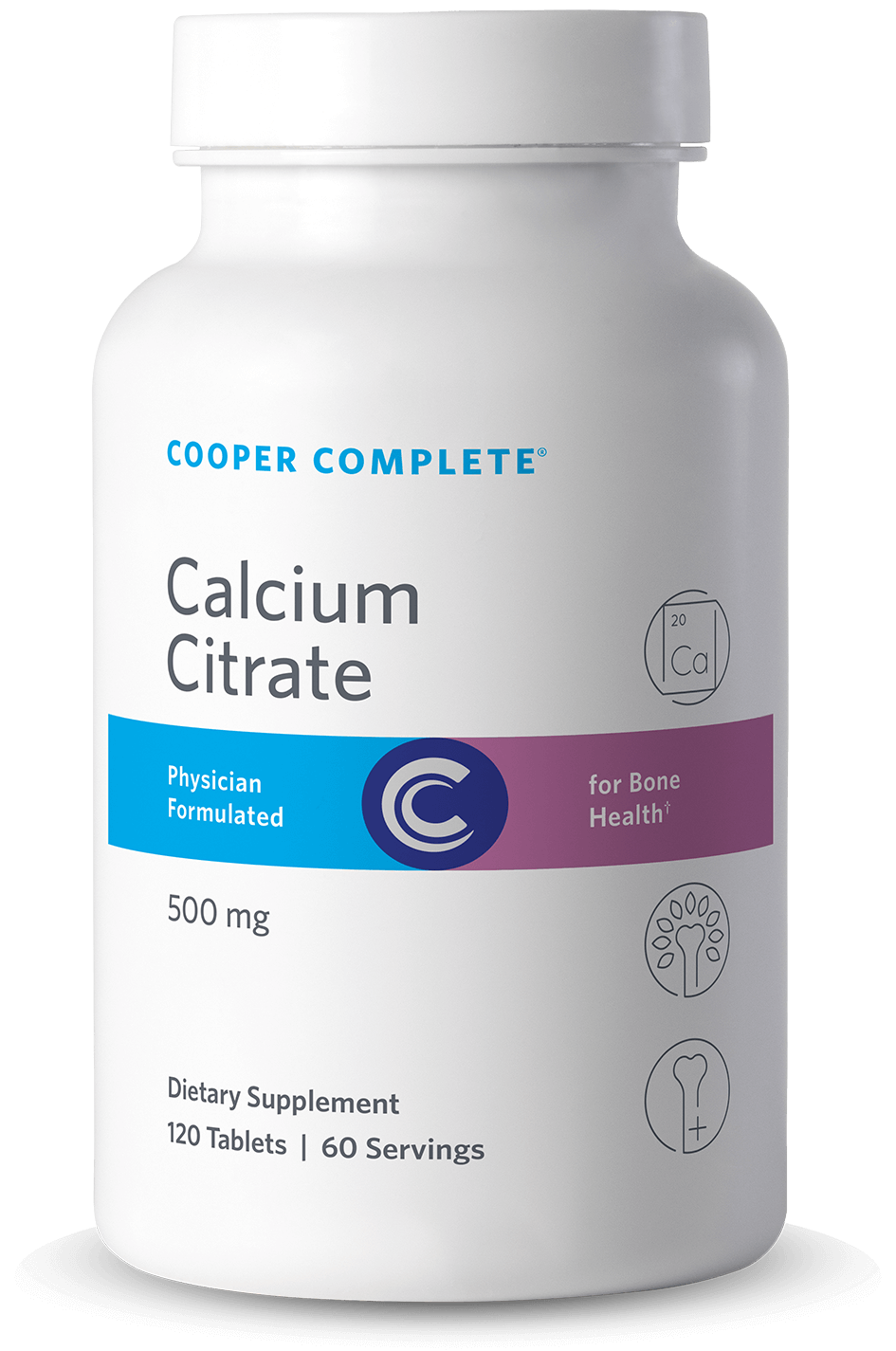
Calcium Citrate Supplement 500 mg
Calcium (macromineral)
- Benefits: Calcium is an essential mineral needed for overall health. According to the National Library of Medicine, we have more calcium than any other mineral in our body. While 99 percent of calcium is stored in bones and teeth, the remaining one percent still plays a significant role by helping blood vessels move blood throughout the body and assisting muscles to expand and contract.
- Recommended Daily Value: Because of its role in helping develop strong bones, growing children and teenagers need more calcium. National Institutes of Health recommends 1300 milligram (mg)/day for children ages 9-18 and pregnant or breastfeeding mothers. Adults aged 19-50 and men aged 51-70 should consume 1000 mg/day, while women over 51 and men over 71 should consume 1200 mg/day.
- Food Sources: Calcium-fortified foods such as milk, cheese, and yogurt are excellent sources of calcium. Green, leafy vegetables and fish with soft bones, such as sardines and salmon, also provide our body calcium.
- Supplement Options: If you don’t consume optimal calcium levels in your diet, supplements may be able to help. Cooper Complete Calcium Citrate contains 250 mg of calcium citrate per tablet. Cooper Clinic recommends taking this particular supplement in the evening, before bed. Find out why.
Copper (trace mineral)
- Benefits: Copper is beneficial not only internally but externally. In conjunction with iron, copper has a vital health function as it’s needed for the body to form red blood cells and iron metabolism. It also helps keep the blood vessels, nerves, immune system and bones healthy. In addition, consuming just 3 mg of copper/day has been shown to have a small cardiovascular benefit and can also help improve the appearance of your skin. [Learn more about the mineral health benefits of iron.]
- Recommended Daily Value: Copper deficiency can lead to problems, including anemia and osteoporosis, so getting the recommended daily amount is essential. The daily reference value for copper is 2 mg. The recommended amount for teens 14-18 years is 890 micrograms (mcg)/day. That amount bumps up slightly to 900 mcg/day for adults age 19 and older.
- Food Sources: Oysters and other shellfish are great options if you want to increase your copper intake. Whole grains, beans, nuts and potatoes are also good sources.
- Supplement Options: Cooper Complete Original Multivitamin containing 2 mg copper per serving is an excellent choice if your diet doesn’t provide you with the recommended daily amount. It’s especially beneficial for women in their childbearing years.
Iodine (trace mineral)
- Benefits: Food fuels our bodies, and iodine can be credited for that, as it’s needed for cells to convert the food we eat into energy our bodies can use. According to the National Institutes of Health, iodine can help prevent breast cancer, eye disease, diabetes, heart disease and stroke. Topically, iodine is used to treat inflammation (dermatitis) and other skin disorders such as eczema and psoriasis.
- Recommended Daily Value: For adults and teens 14 and older, the recommended daily value is 150 mcg/day. Pregnant women should get 220 mcg/day, and children under nine should only consume 90 mcg/day.
- Food Sources: The body can’t make iodine on its own, which means it must come from our diet. The most common source of iodine is table salt, where adding iodine makes it iodized. (It’s important to note most specialty salts, including kosher and sea salt, are not iodized. Any salt with iodine added will indicate so on the label.) Other great sources include seaweed, kelp, fish, and shrimp. Milk and milk products also contain iodine.
- Supplement Options: If you’re not getting enough iodine through the foods you eat, try Cooper Complete Original Multivitamins, which contain the daily recommended value of 150 mcg. The iodine comes from kelp, one of the top food sources.
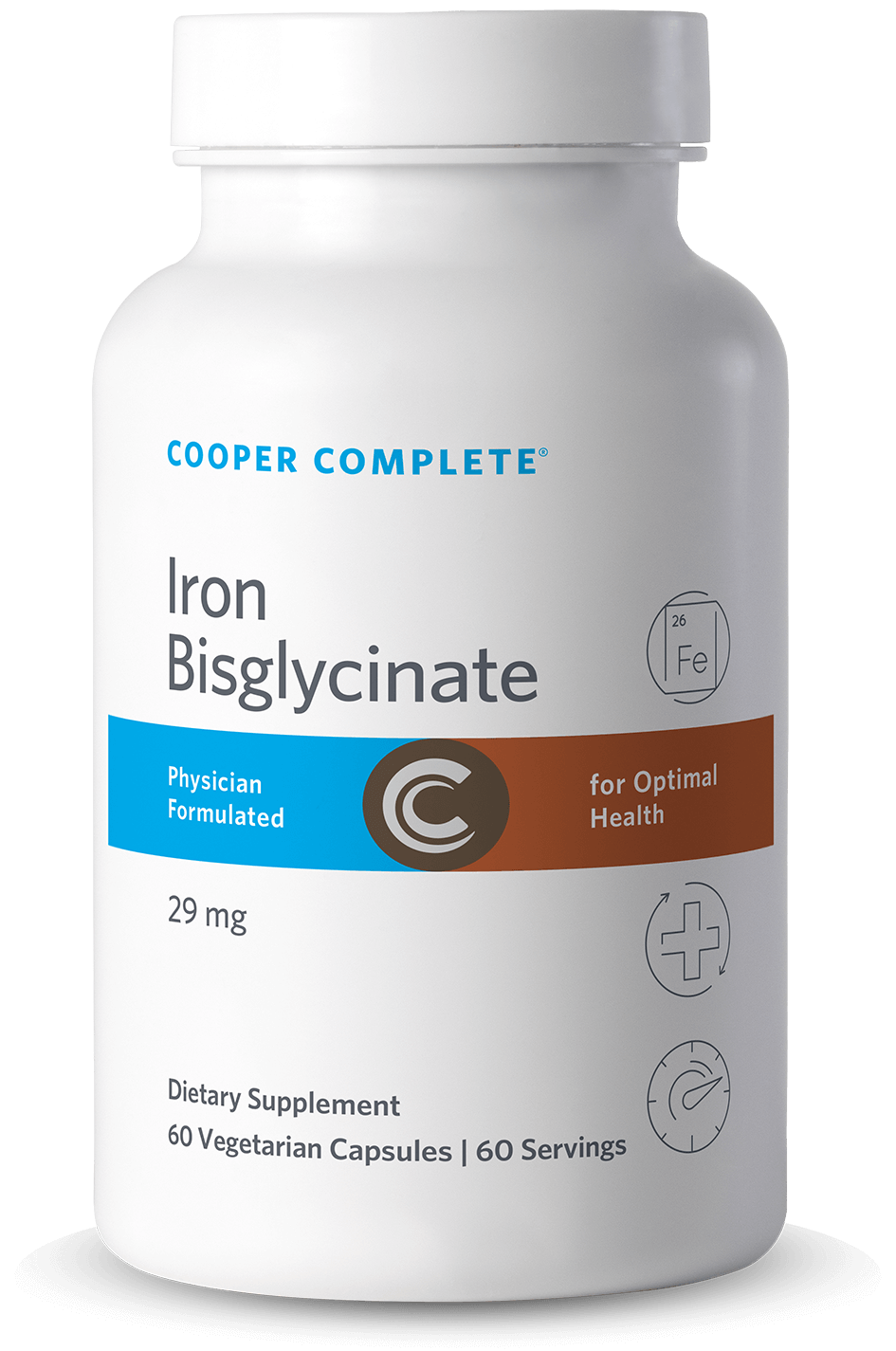
Iron Bisglycinate Supplement 29 mg
Iron Bisglycinate Supplement contains 29 mg of gentle and highly absorbable Ferrochel® (a patented chelated iron in the form of iron bisglycinate) intentionally designed to avoid gastric upset or constipation.
$16.98 Add to cart
Iron (trace mineral)
- Benefits: Iron is an essential component of hemoglobin, allowing red blood cells to transfer oxygen from our lungs to our body’s tissues. Iron supports muscle metabolism and connective tissue health and is necessary for growth and neurological development.
- Recommended Daily Value: The recommended daily value is 18 mg/day for adults and children four and older.
- Food Sources: Bread, cereal, and other grains account for about half of the dietary iron consumed by Americans, although meat and seafood are rich in iron. Beans, lentils, spinach, and tofu are also good sources of iron. Heme iron comes from animal sources, whereas iron from plants is non-heme. Heme iron is more bioavailable and easily absorbed in the body. Nonheme iron absorption is improved by pairing with foods (or supplements) containing vitamin C, such as citrus, peppers, and tomatoes.
- Supplement Options: If you’re not getting enough iron through food, try Cooper Complete Original and Basic One Multivitamins, which include the daily recommended value of 18 mg. Cooper Complete Time Release Iron with 54 mg Ferronyl® (carbonyl) iron in an easy-to-digest, non-binding supplement is an excellent choice for adults who need much higher levels of iron supplementation.
Manganese (trace mineral)
- Benefits: Manganese, while not a mineral familiar to many, is considered an essential nutrient. The mineral aids in processing cholesterol, carbohydrates, and protein. Manganese can be used to help those who suffer from weak bones or osteoporosis. It can also help those who suffer from anemia and can help improve symptoms of premenstrual syndrome. Manganese may also protect against free radicals and helps in maintaining healthy connective tissue in the skin.
- Recommended Daily Value: The National Institutes of Health recommends that adults receive 2.3 mg/day but no more than 11 mg/day of manganese.
- Food Sources: Manganese is in whole grains, nuts, and leafy vegetables. Brown rice, garbanzo beans, kale, spinach and oats are excellent sources. Manganese is also in tea, so enjoy a glass of iced or hot tea to help boost your level.
- Supplement Options: Although intake data is limited, NIH believes most people get enough manganese through a regular diet. For this reason, Cooper Complete supplements do not contain manganese.
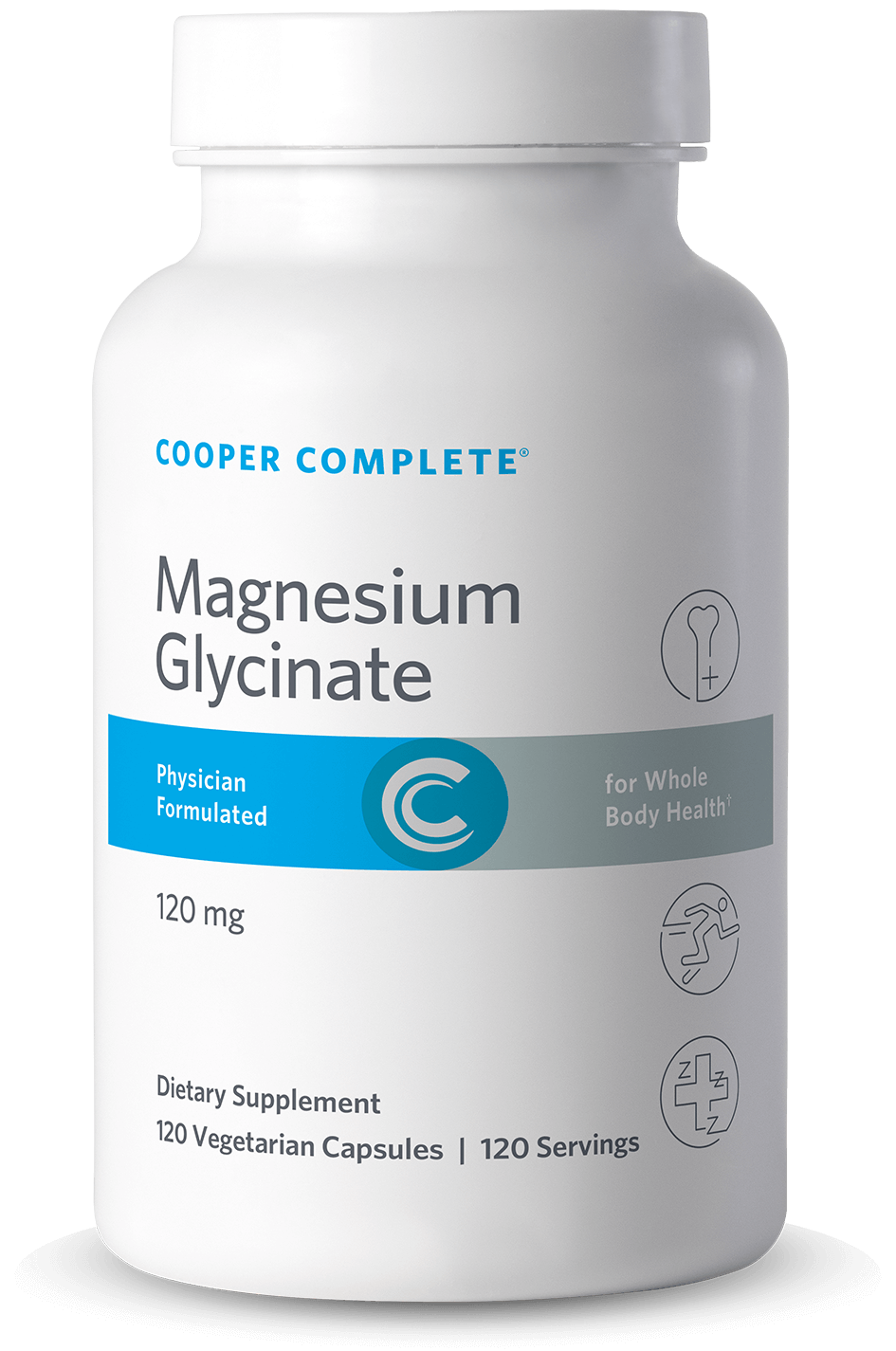
120 mg Magnesium Glycinate Supplement
Chelated magnesium glycinate (also known as magnesium bis-glycinate) is well absorbed without significant laxative effects.
$24.98 Add to cart
Magnesium (macromineral)
- Benefits: The mineral health benefits of magnesium are plentiful. The fourth most abundant mineral in our body, magnesium, helps regulate muscle and nerve function, blood sugar levels and blood pressure.
- Recommended Daily Value: The daily reference value for magnesium is 400 mg/day for men ages 19-30 and 420 mg/day for men over 30. The daily reference value for magnesium is 310 mg/day for women ages 19- 30 and 320 mg/day for women over 30.
- Food Sources: Adding legumes, nuts, seeds, whole grains, and green leafy vegetables is a great way to increase your magnesium level. Fortified breakfast cereals often include ten percent of the daily value of magnesium.
- Supplement Options: Try Cooper Complete Original multivitamin, with 660 mg, Basic One multivitamin with 200 mg, or a Magnesium Supplement. Magnesium Glycinate has 120 mg per serving.
Phosphorus (macromineral)
- Benefits: Phosphorus makes up about one percent of total body weight and is the second most abundant mineral in the body, after calcium. This mineral can be found in every cell and, like calcium, is concentrated in bones and teeth. Phosphorus assists in kidney function, muscle contractions and nerve signaling.
- Recommended Daily Value: Phosphorus is a critical macromineral, especially for children and teens who are rapidly growing. That’s why 1250 mg/day is recommended for those between the ages of 9-18. After 18, the recommended value drops to 700 mg/day.
- Food Sources: Phosphorus naturally occurs in protein-rich foods such as meat, poultry, fish, and eggs. Milk and dairy products account for about 20 percent of the phosphorus in our diet, while bread, tortillas, and other bakery products are approximately ten percent. Phosphorus additives to preserve moisture and color in processed foods account for ten to fifty percent of our intake.
- Supplement Options: If you’re not getting the recommended amount of phosphorus from your diet, try supplementing with Cooper Complete Original Multivitamins containing 160 mg.
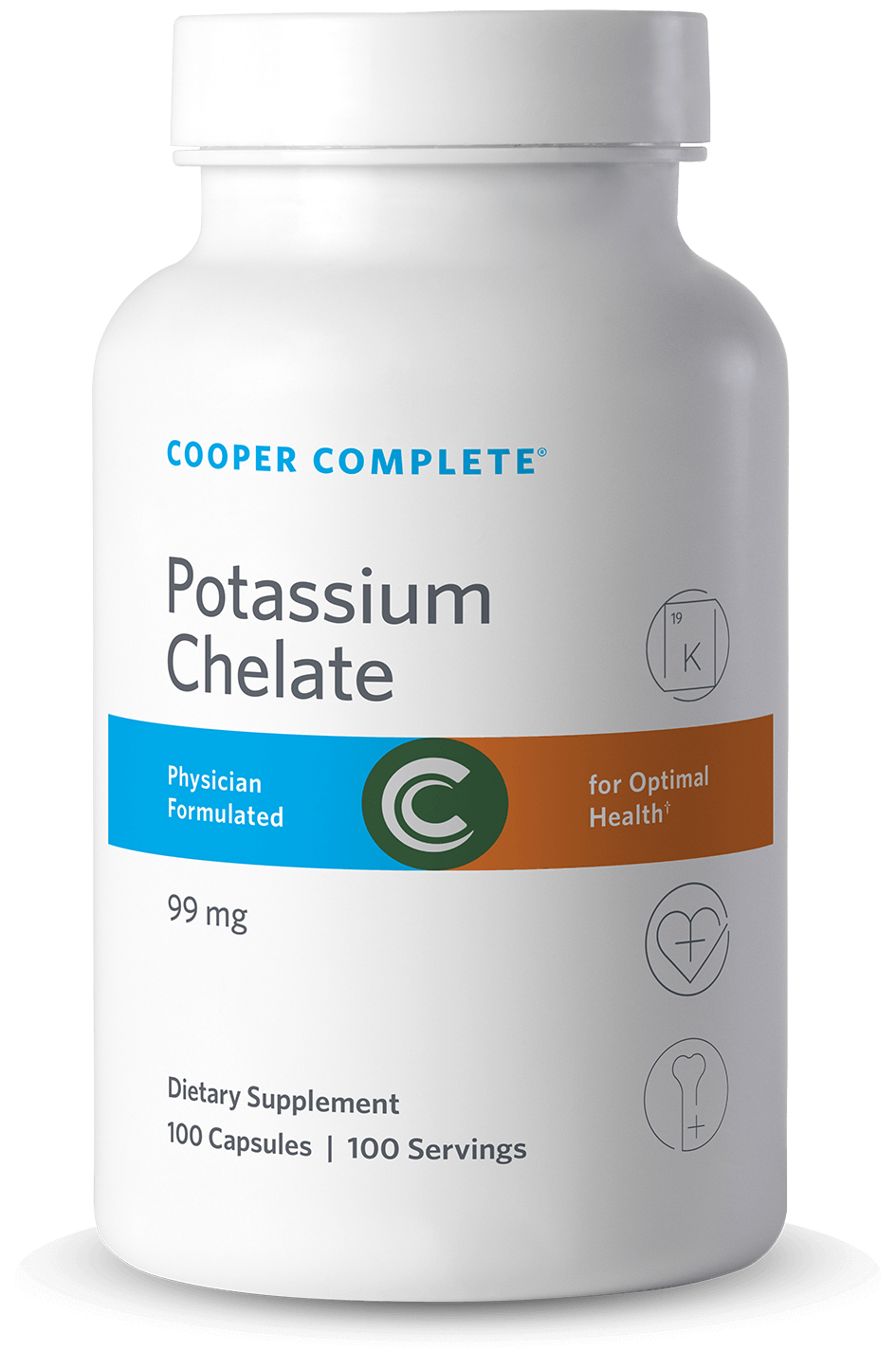
99 mg Potassium Chelate Supplement
Cooper Complete® Potassium Chelate Supplement contains 99 mg potassium to support already normal blood pressure, muscle-skeletal function, and nerve impulses.†
$16.48 Add to cart
Potassium (macromineral)
- Benefits: Many benefits potassium offers come down to our body’s building and breakdown process. Potassium is necessary to build muscle and proteins and break down and use carbohydrates.
- Recommended Daily Value: The USDA recommends people ages 14 and above consume 3500 mg of potassium/day.
- Food Sources: Picky eaters will be happy to know that achieving a daily dose of potassium-rich foods is relatively easy. That’s because most food items contain potassium. Meat, seafood, vegetables (including broccoli and sweet potatoes), citrus fruits and milk, yogurt, and other dairy products contain potassium.
- Supplement Options: Try the Cooper Complete Original Multivitamins, which provides 400 mg/serving. Chelated Potassium Supplement contains 99 mg/serving.
Selenium (trace mineral)
- Benefits: Selenium is an essential mineral needed for overall health, including reproduction, thyroid gland function, and DNA production. Selenium also helps protect the body from damage caused by free radicals and viral infections.
- Recommended Daily Value: The USDA recommends that adults and teens age 14 and older receive 55 mcg/day. Pregnant women should increase their dosage to 60 mcg/day, and children under eight should only ingest 20-30 mcg/day.
- Food Sources: Selenium is found naturally in many foods. That’s because the soil is generally rich in this mineral. For animals, eating foods that come from selenium-rich earth is also helpful. Selenium-rich food sources include grain products (such as cereals and wheat bread), chicken, eggs, dairy (such as cottage cheese), and seafood (such as tuna and halibut). Brazil nuts contain more selenium than any other food, with 544 mcg in a one-ounce, 6-8 nut serving.
- Supplement Options: Needing to supplement? Original Multivitamins and Dermatologic Health Skin Hair and Nails both contain 100 mcg of selenium/serving.
Zinc (trace mineral)
- Benefits: The health benefit of zinc is quite simple – you need this mineral to stay healthy. Zinc helps our immune system fight off invading bacteria and viruses. Zinc is also essential during pregnancy and early childhood, as it helps your body grow and develop.
- Recommended Daily Value: The daily reference value for zinc is 15 mg.
- Food Sources: If you love oysters, you’re lucky, as a 3-ounce serving contains 74 mg of zinc. A similar serving of beef or crab has only 5-7 mg, while chicken breast has 0.9 mg. Good sources of zinc for vegetarians include whole grains, tofu, tempeh, legumes, nuts and seeds, fortified breakfast cereals, and dairy products.
- Supplement Options: People with gastrointestinal and other diseases, like diabetes, vegetarians and heavy drinkers, are all at risk for zinc deficiency. Try Cooper Complete’s Eye Health Supplement, Original multivitamin, Dermatologic Health Skin Hair and Nails, or 10 mg, 12 mg, or 30 mg standalone zinc supplements.
The health benefits of minerals are clear. Making sure you eat mineral-rich foods, drink plenty of water, exercise daily and get enough sleep are all things you can do to live a healthier lifestyle. One of Dr. Kenneth H. Cooper’s “8 Steps To Get Cooperized™“ includes taking the right supplements for you.
Article provided by Cooper Complete team.
